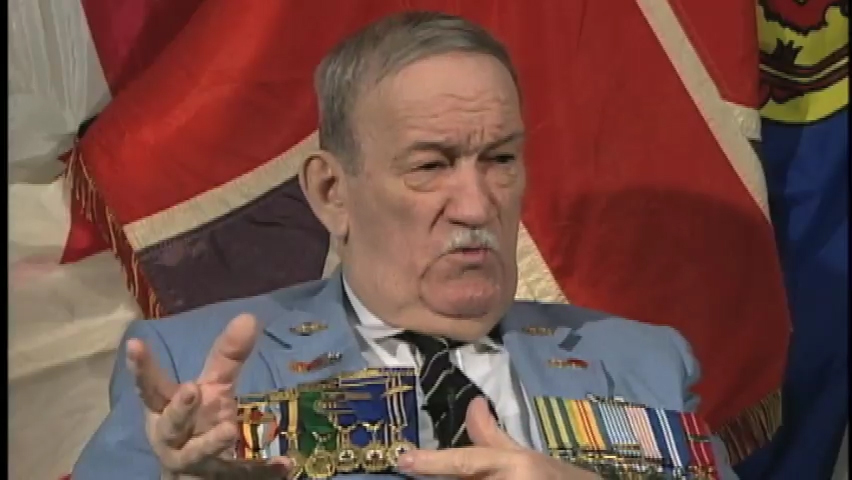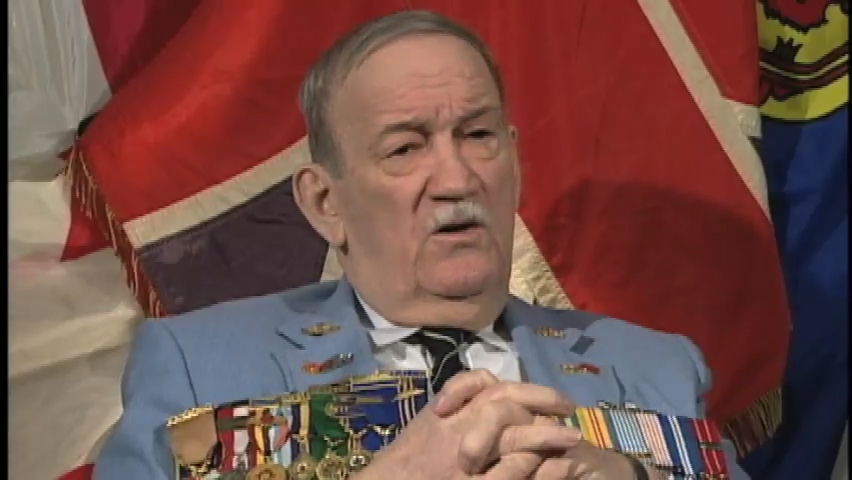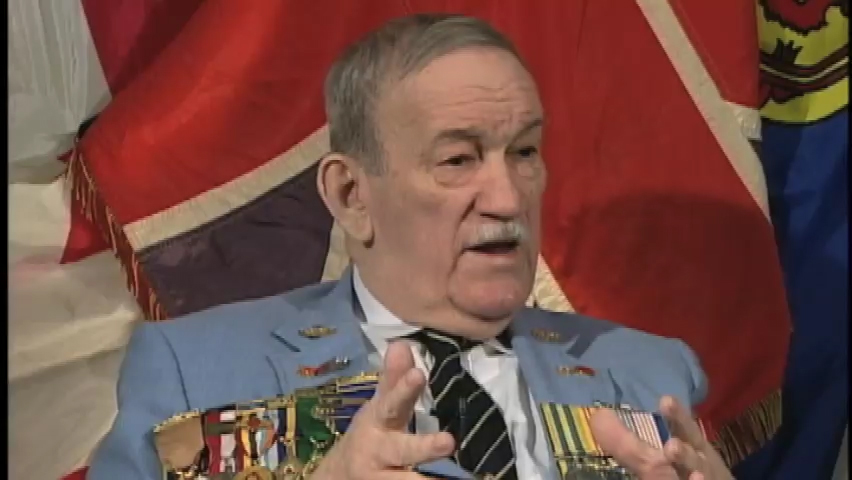My Brother, the POW
Heroes Remember
My Brother, the POW
Transcript
He went in 1943, and he went in D-Day, and he was taken prisoner
under Kurt Meyer. They went in, when they landed they went in
too actually went in too far, they advanced too far and they ran
out of ammunition and they got surrounded by the Germans.
That was SS at that time, and Kurt Meyer was the colonel
or general of the SS. And you recall there was a bunch of them
were taken into a forest and shot. They were murdered,
they weren't shot, they were murdered by them. And I remember
he was telling me about, he was marching down the road and
there was a German Officer was in the ditch and he had a machine
gun and he was out of his mind and he started firing at them.
So three of them jumped in the ditch, and one fellow was below
him and he was in the middle and the other guy jumped on top
of him. The fellow below him was killed and the fellow on top
was killed and his... When he got up they took him out of the
ditch, the Germans, got up and his, his tunic was ripped right
in the front, and it cut his pay book right in two. That's how
close the bullets came to him but he, funny thing, he in the
centre survived. But then they fired him into the box cars and
took them off to Germany and they were in there, he said they'd
open up the cars once a day or so and fire in some black bread.
That's all they had to eat. Then he said there was an air raid
one time and the train stopped. He looked out and there was
American air planes these Lockheed Lightnings the double fuselage
types they had out at that time, and they were dropping bombs and
they didn't know what the, I guess they didn't know that the
trains had prisoners on it. And they, but he looked and said that
the concussion of the bombs, the horses and the cattle out on the
field were dropping from the concussion from those bombs.
Then they got into the prisoner of war camp and it was one of the
Stalag camps and he said the old, they had some old fellows
there, First World War guys, they were like, they were good he
said. They'd sneak you a cigarette once in a while and old
soldiers, but he said the Hitler Youths were in there, they were
bad and the odd SS would be in there too. They'd be fellows that
got wounded in the field, so they'd send them in there to do
guard duty in the camp, they were bad. But these people were
indoctrinated from the time they were you know, 12 years old.
When he got taken prisoner the, it came back missing in action,
so we didn't know if he was killed or what. It was, oh months
after we came to find that he was prisoner of war. So they're
all very, very worried, didn't know and he was, well they had
quite a tough time in there. But when he got home, he was
like a brand new person. He just, you know everything was,
the food and so on, like he had nothing. Like he said, he'd be
going through a, try to pick up a, what do you call them,
a clover, and found the clover, eat the clover in this camp on
the grass close to the fence. And first thing a German came
and hit him over the back with a rifle for eating this piece
of clover. And another time they were supposed to have soup
and they haul this thing out, this carcass and it, it was a,
they thought it was a rabbit at first but it was a cat. And what
could they do? They had to eat this stuff. The Germans never had
much themselves in those times, at that time. They were pretty
getting in to the end of the war, that was '43. It was around '44
he was liberated by the Russians and, they weren't that great.
All these guys that got liberated... He had a good pair of shoes
was about the only thing he had and the Russians took his shoes,
or his boots, his army boots. And he was, had to get new boots.
But when he came home he was so glad to get home and he,
'course he always liked his drink before the war and during it so
when he got home he started having his little tots. He would
never talk too much about it. Only once and a while he'd be alone
and he'd be probably having a little tot and then he'd start
letting on some stuff but not in a crowd. He wouldn't let,
he'd never, not general conversation would he ever talk about it.
They even (inaudible) prime him up to get him tell stuff
and he was very evasive of it.
Description
While he was still a child, Mr. Doolan's brother enlisted to serve during the Second World War and was made a prisoner of war. He talks about this ordeal.
William G. Doolan
Mr. Doolan was born in Sydney, Nova Scotia on May 2, 1930. He grew up during the Second World War knowing that his brother had been made a prisoner of war. When Mr. Doolan was old enough, he joined the militia and in 1950 enlisted in the army to go fight in Korea. After completing his training in Petawawa, he was sent for further training in Japan, and then to the front where he was a rifleman for the infantry. Aside from a bout of malaria, he escaped unscathed and returned home to his family.
Meta Data
- Medium:
- Video
- Owner:
- Veterans Affairs Canada
- Duration:
- 04:18
- Person Interviewed:
- William G. Doolan
- War, Conflict or Mission:
- Second World War
Related Videos
- Date modified:





